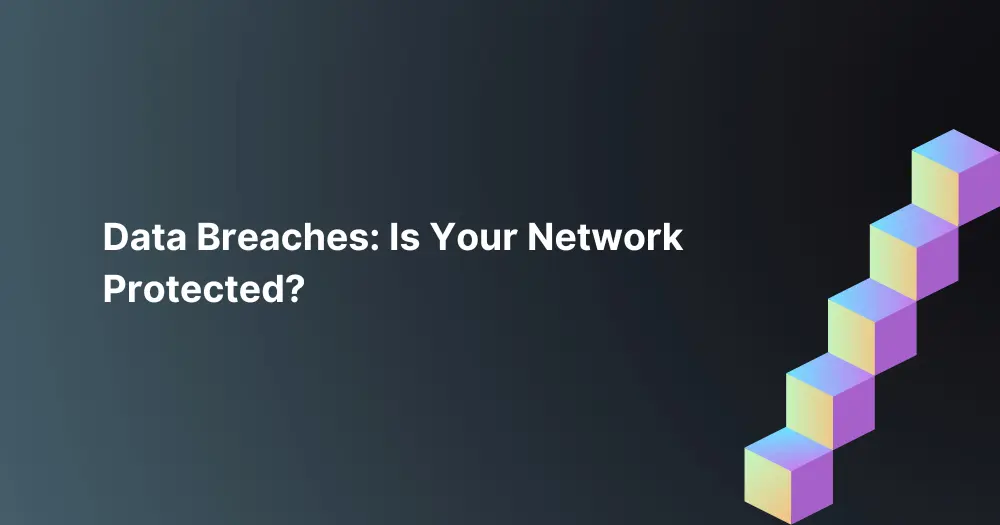
Over the past year, data breaches have spiked, driven by an increasing reliance on remote work and a constantly changing threat environment. Cybercriminals have swiftly capitalized on these vulnerabilities, posing significant risks to businesses of every size. Small businesses, in particular, have found themselves at risk due to limited resources and expertise in dealing with these sophisticated attacks. As a result, businesses must give priority to cybersecurity and safeguard their networks against data breaches. This comprehensive guide provides the insights and tools to assess, enhance, and maintain your network security.
Data breaches can occur in various ways, each posing unique threats to your business. Here are some common types of data breaches and their causes:
Insider threats arise when employees or other authorized users misuse their access privileges to steal or compromise sensitive data intentionally or unintentionally. This could result from malicious intent, negligence, or accidental actions.
Phishing attacks involve cybercriminals sending fraudulent emails that appear to come from legitimate sources. Often containing malicious links or attachments, these emails are designed to deceive recipients into disclosing sensitive information or inadvertently installing malware on their devices.
Ransomware, a form of malware, encrypts a victim’s data and keeps it hostage, rendering it inaccessible until the required ransom is paid. Cybercriminals usually demand payment in cryptocurrencies such as Bitcoin to avoid being detected.
Software vulnerabilities refer to weaknesses in applications or operating systems that can be leveraged by cybercriminals to obtain unauthorized access to a network. Neglecting to apply crucial security patches and updates may leave your network susceptible to these threats, potentially compromising the safety of your digital assets and operations.
Insufficient security settings, like weak passwords or misconfigured firewalls, can inadvertently open avenues for attackers to breach your network and gain access to vital data. By exploiting such vulnerabilities, cybercriminals can compromise your organization’s sensitive information and disrupt its operations.
An effective network security strategy begins with understanding your environment’s potential risks and vulnerabilities. Here are some steps to help you assess your current security posture:
Determine which assets and data are most crucial to your business operations and require the highest level of protection. This could include customer information, financial records, intellectual property, and employee data.
Seek assistance from cybersecurity professionals who can carry out an extensive risk assessment to identify potential threats and vulnerabilities within your network. This process takes into account factors such as hardware and software weaknesses, employee conduct, and the likelihood of being targeted by cybercriminals.
Review your security policies and measures to determine their effectiveness in mitigating identified risks. Look for gaps in your defenses that attackers could exploit and prioritize addressing these vulnerabilities.
Implementing robust security practices is vital to safeguarding your network from data breaches. Consider the following best practices to enhance your network security:
Enforce strong, unique passwords for all user accounts and change them regularly. Encourage password managers to help users maintain complex passwords without resorting to insecure methods like writing them down.
Educate employees about common cybersecurity threats, the importance of following security policies, and the potential consequences of non-compliance. Regular training and awareness programs can help foster a culture of security within your organization.
Consistently update all software, including operating systems and applications, with the most recent security patches. Regular updates can aid in defending your network against known vulnerabilities that attackers might exploit.
Introduce multi-factor authentication (MFA) for all user accounts, especially those with access to sensitive information or administrative rights. MFA enhances security by requiring users to present two or more forms of identification before accessing your network.
With the increasing prevalence of remote work, ensuring secure remote access to your network is essential. Use VPNs, encrypted connections, and strict access controls to protect your network from unauthorized access.
Investing in the right cybersecurity solutions is crucial to protecting your network from data breaches. Here are some essential tools and services to consider:
Implement network firewalls to vigilantly supervise and manage incoming and outgoing traffic, adhering to pre-established security guidelines. Utilize intrusion detection systems (IDS) to identify and promptly notify you of potential security breaches in real-time.
Equip all devices connected to your network with endpoint protection and antivirus software. These tools aid in averting malware infections, identifying and eliminating threats, and safeguarding against cyberattacks.
Employ secure email gateways and spam filters to shield your organization from phishing attacks, spam, and various email-related threats. These solutions can help you block malicious emails, identify and quarantine suspicious messages, and maintain a secure email environment.
Safeguard sensitive data both at rest and in transit using encryption technologies. Opt for secure file-sharing tools providing end-to-end encryption, access controls, and audit logs to guarantee the safe exchange of sensitive data.
Consider partnering with a managed IT provider that specializes in cybersecurity. These providers can offer comprehensive security management, including network monitoring, threat detection and response, and ongoing security assessments.
A well-defined response plan helps minimize damage and enables swift recovery in case of a breach. Some components of an effective data breach response plan include:
Protecting your business from data breaches requires a proactive approach to network security, encompassing risk assessment, best practices, and the right cybersecurity solutions. By following the guidance provided in this comprehensive guide, you can significantly enhance your network security and safeguard your business against data breaches. Don’t wait for a breach — act now and invest in robust cybersecurity measures.
With decades of experience and success in cybersecurity, BlackPoint IT has helped businesses protect their networks and data. We offer comprehensive cybersecurity solutions to protect businesses from data breaches. By providing tailored strategies, advanced security solutions, and expert guidance, we help organizations maintain robust network security and safeguard their valuable data. Schedule a consultation to learn how BlackPoint IT can secure your network and safeguard your valuable data.